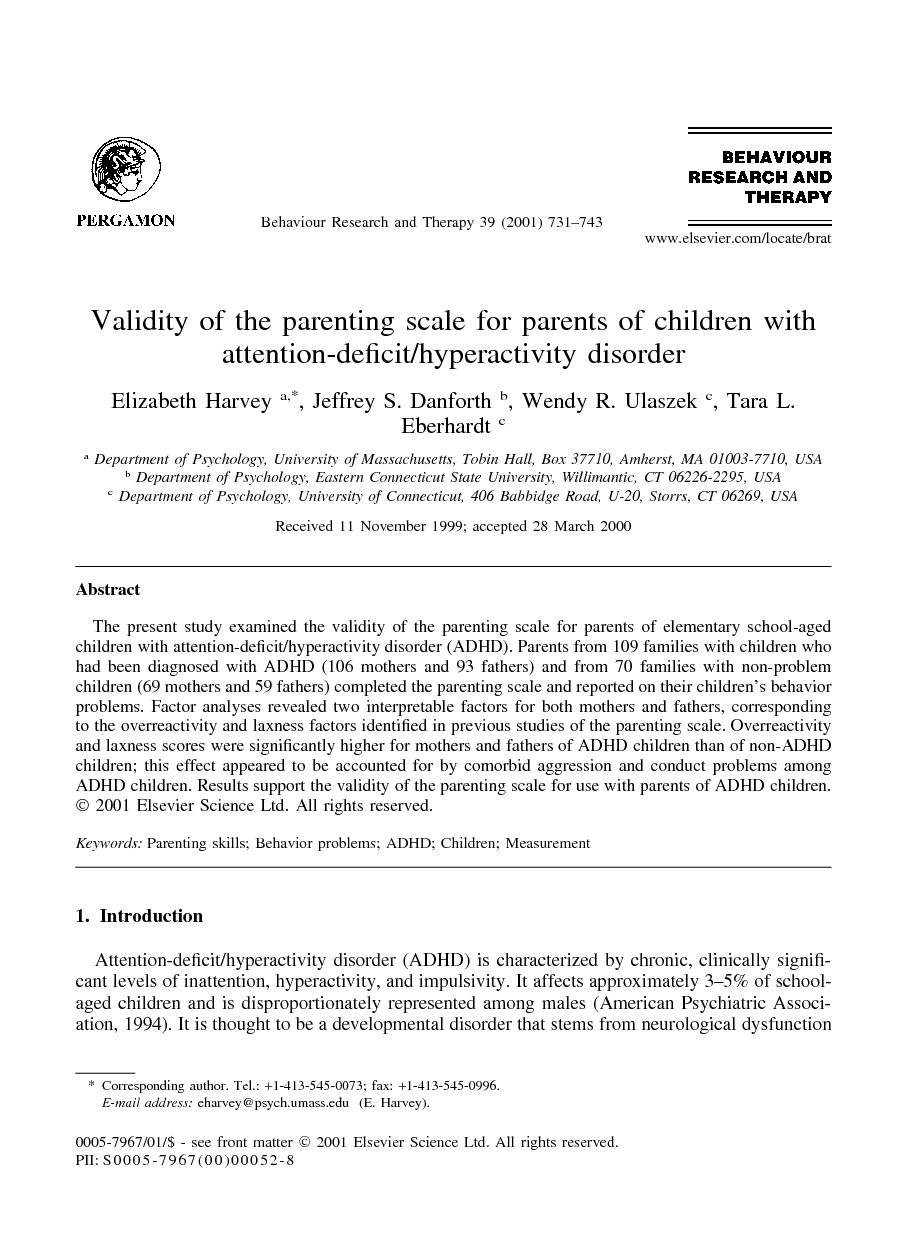Attention-deficit/hyperactivity disorder (ADHD) is characterized by chronic, clinically significant levels of inattention, hyperactivity, and impulsivity. It affects approximately 3–5% of school-aged children and is disproportionately represented among males (American Psychiatric Association, 1994). It is thought to be a developmental disorder that stems from neurological dysfunction caused by biological and genetic factors (Barkley, 1990). The disorder typically causes significant impairment across many domains; ADHD children often have considerable difficulty with academic performance and social and family relationships (Frick et al., 1991, Gaub and Carlson, 1997 and Johnston, 1996). They are also at risk for developing a variety of comorbid psychiatric disorders including conduct disorder (CD) and oppositional defiant disorder (ODD; Barkley et al., 1990, Barkley et al., 1990 and Szatmari et al., 1989), which may cause even greater maladjustment.
Theory and research suggest that parenting behavior may play an important role for ADHD children. Although many researchers do not believe that parental discipline plays a large etiological role in the development of ADHD per se (e.g., Barkley, 1998 and Whalen and Henker, 1998), discipline is thought to play an important role in managing ADHD symptoms and in contributing to the development of ODD and CD among ADHD children (Barkley, 1990 and Whalen and Henker, 1998). Observational studies have found differences between parents of ADHD and non-ADHD children and weaker parenting behavior is most pronounced among parents of ADHD children with comorbid ODD (Barkley et al., 1991, Johnston, 1996, Lindahl, 1998, Loney, 1987 and Stormont-Spurgin and Zentall, 1995). Theory and research suggest bi-directional influences with the behavior of ADHD children influencing the behavior of their parents, which in turn exacerbate ADHD symptoms and potentiate the development of ODD and CD in the child (see Danforth, Barkley, & Stokes, 1991, for a review). Furthermore, the effectiveness of parent training programs that focus on discipline of ADHD children (Danforth, 1998 and Pisterman et al., 1989), provide strong support for the important role of discipline in managing ADHD symptoms and associated behavior problems.
Therefore, assessing discipline strategies of parents with ADHD children may be important both in clinical and research settings. Research in this field has relied primarily on observational measures of parenting. Developing measures that use other methods could enhance assessment of parental discipline. A self-report measure of discipline could complement observational assessments of parenting by providing a multi-method parenting assessment that would likely have more validity than using either measure alone (Mash and Terdal, 1997 and Schwarz et al., 1985), or it could be used alone when cost-effectiveness is needed or when direct observation is not practical. However, there is currently no self-report measure of parental discipline that has been validated for use with parents of ADHD children.
The parenting scale is a self-report measure of parental discipline that has been validated on parents of preschool-aged children (Arnold, O’Leary, Wolff & Acker, 1993) and young adolescents (Irvine, Biglan, Smolkowski & Ary, 1999). This self-report scale provides a quick, cost-effective assessment of discipline practices, and has been shown to correlate highly with observational assessments of parenting (Arnold et al., 1993). It is potentially useful in clinical settings for identifying targets in parent training, and in research settings for understanding the correlates of parental discipline. This scale could have significant utility in work with elementary school-aged children both with and without ADHD; however, it has not yet been validated with this population.
The present study sought to evaluate the psychometric properties of the parenting scale among elementary school-aged children with and without ADHD. The validity of this scale was explored in several ways. The study first evaluated the construct validity of the scale by examining the factor structure of the measure in this population and comparing it to the factor structure found in the parenting scale with other populations. Second, the discriminative validity of the scale was tested by comparing non-ADHD children to ADHD children both with and without ODD/CD. It was predicted that parents of ADHD children would report more problematic discipline than parents of non-ADHD children. It was also predicted that parents of children with comorbid ADHD and ODD/CD would report more problematic discipline practices than parents of both pure ADHD and non-ADHD children. Finally, reliability of the scale was examined by calculating the internal consistency of the scale.


